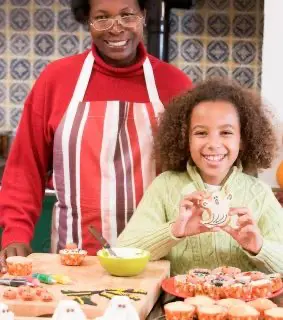
How Parents can Help Kids Fit-in Socially and Make Friends
by Greta Jenkins M.Ed.
A new social scene, especially making new friends, can be very challenging. It's not easy to have new classmates, join a brand new soccer team, transfer to a new school, go away to camp alone, or move. We aren't happy campers when kids cry out: "You're ruining my life!" "Why are you sending me to that stupid old school?" "Why can't we move back to our old neighborhood?"
Seeing our kids lonely, feeling left out, and missing their old group makes us feel helpless.
Our best efforts won't be able to ease their pain because their best friends are left behind, and they can't fit in with the new crowd. But we can ease their discomfort by making the transition a bit easier.
We can help them find ways to make new friends. And even teach them new friendship-making skills that may be useful in other social settings as well. It is important to stay positive, and to focus on ways to boost your child's friendship quotient and help him get through this tough period.
Is there anything I should say?
Whenever your child doesn't share her feelings, you can help her recognize them. "You must be feeling lonely and missing your old group." "I can understand your concern." It can be difficult to join a new team when you don't know any of the kids. She should know such feelings are normal.
It may take time to meet new kids and make new friends. Many of these kids have been friends with one another for some time, and may not be very receptive to a new person joining in." "Remember back when you didn't know anyone-even Kevin-and then you became great friends." Like you did at our other home, you will make new friends in time.
Even if your child won't talk to you, keep talking. "Is there anything I can do to make you feel more comfortable?" "Do the kids wear anything different from home?" "Would you like me to speak to your teacher?"
A kid learns to cope with a new situation by relying on their strengths. Tell your child about his talents so he can learn to rely on them. We don't know anyone at first, but I know you'll make friends. Once they get to know you, they'll like you. You're fun to be around." "You made friends back home whenever you played soccer. The kids saw your skill and wanted to play with you."
"I bought you a pre-paid phone card that you can use whenever you want to call your friends back home." "Would you like to invite your friend to stay for the weekend? I can talk to his mom about it."
Is there anything I should do?
Familiarize yourself with other parents. Serve as a room parent, organize carpooling, volunteer to coach, be the team mom, get to know the parents of fellow campers, and join PTA meetings and school gatherings. Making acquaintances with the guardians of your kid's possible companions is often an ideal approach to invite them over and give your child a fresh playmate. Don't forget to introduce yourself to the people in your neighborhood; oftentimes our children's greatest pals can be right next door! Ask among your workmates who has kids: it's beneficial not only for finding out about recreational activities but also scheduling play dates for younger children (or a babysitter!).
If possible, visit your child's new school and neighborhood before the move. Schedule meetings with the principals and teachers. Get a sense of what it's like by asking the camp for photos, phone numbers, and e-mail addresses of other kids who have attended. If possible, watch a team practice, speak to the coach or to former members to get a sense of what it's like to be a part of it.
Search for places and activities that are attractive to your little one, to help them make friends. Look for opportunities for them to socialize with other kids -these can include scouting, park and recreation programs, Boys and Girls Clubs, YMCAs, 4-H, Teen Clubs, church groups, sports teams, library programs, after-school programs or other youth organizations. To find out what is going on around the area locally, it is worth checking pediatrician's offices and libraries as they often keep up to date information on events specifically aimed at children. Whilst making friends is down to your child you should look at ways in which you can support them in their search of potential friendships.
Encourage your child to explore activities that best fit their interests. If tennis is a favorite for them, consider placing them in a tennis program. Maybe music is more their style, which can be further developed with lessons. Swimming or another activity like soccer, skateboarding, roller blading, dirt biking, jazz band and/or chess can provide not only an opportunity to learn a new skill but also time to socialize with kids who have similar interests. With the right guidance, they will become more confident and may even make lasting friendships.
Make sure your kid blends in. Clothes, hair styles, shoe styles, and accessories really do matter in gaining peer approval, and communities do have their own traditions. If possible, visit your kid's school before you move and study the appearance of the most popular kids. Does your kid dress like them? If not, help him find the style to blend in.
Provide a telephone book or phone contact list. Provide your child with a small book (or at least a note card) or help him learn how to add contacts to his phone. If he does meet someone new, suggest that he write down the kid's name, phone number, or e-mail address on the card.
Teaching new social skills requires practice, so role-playing "Making New Friends" with your child is a great way to help them feel more confident while using it. Demonstrate what introducing yourself looks like by doing it with your child. Look for opportunities in the real world to show off the skill: when waiting in line at the store, at school or the park. Kids learn better when they can see something first rather than do it, so make sure you give them plenty of chances to watch you!
The U.S. Census Bureau has stated that one-fifth of all Americans move residences annually, with nearly half relocating at least once in a five-year span. Consequently, many families are facing the same struggles as yours and you shouldn't feel overly guilty if your kids give you a hard time over the situation. It is important to note, however, that 23 percent of children who moved frequently had to repeat a grade, compared with 12 percent of children who had very few or no relocations in their life thus far. The takeaway from this is to stay connected to your child's teacher, even if they inform you that "everything's fine".
Greta Jenkins Ed.D.
Greta is an educational psychologist, parenting expert, artist and author of “Do siblings influence one another? More about Greta Jenkins
|
Michele Borba, Ed.D. is an internationally renown educator, motivational speaker, who has presented keynotes and workshops to over one million parents and teachers on four continents, and is the recipient of the National Educator Award. Dr. Borba serves on honorary board to Parents magazine and has appeared as a guest expert on Today, The Early Show, The View, Fox & Friends, MSNBC, and NPR. She is the award-winning author of 20 books including www.micheleborba.com.
|
Positive Parenting Tips
10 Ways to Raise a Successful Leader
Change Your Thoughts and You Change Your World:
Teaching Kids the Art of Productive Thinking
About Us-
Contact Us -
Privacy Policy©2023 TheParentVine.com a brand owned by GADL Enterprises, LLC. All rights reserved.
TheParentVine.com earns commissions on products sold.



